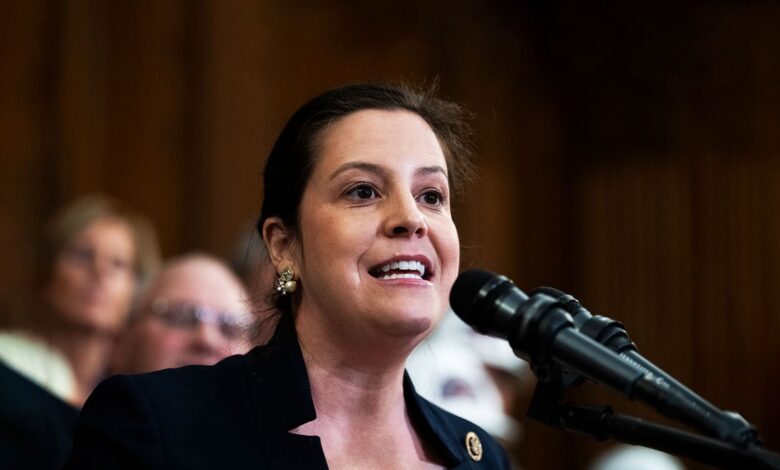Elise Stefanik’s audience of one: How anti-woke showboating got her the UN job

Successful diplomats are duplicitous by craft, and, often by nature: They move, stealthily, beneath statesmen’s public phrases and grand pretensions, to negotiate with foreign powers in an endless “swirl of lusting, murderous, satanic desire,” as the late Charles Hill, a former diplomat and speechwriter for Henry Kissinger, put it in his book “Grand Strategies.” They serve their superiors reliably yet sometimes secretly, occasionally contravening their superiors’ domestic interests by distorting what they tell them about bargains being struck with adversaries to hold off blood-dimmed tides.
Donald Trump has just offered America’s U.N. ambassadorship to a noisy sycophant whose cut-and-thrust tactics toward Americans citizens on college campuses have been on display since 2023, as I noted in January in a long essay for Salon about the origins of American preoccupations with Israel/Palestine. As chair of the House of Representatives’ Republican conference, Rep. Elise Stefanik of New York appointed herself an official alarmist about antisemitism by spearheading a Dec. 5, 2023, committee hearing on what she called “the rot of antisemitism” in student protests against the war in Gaza.
She demanded that university presidents at the hearing answer “yes or no” to her hypocritically accusatory question about campus protesters: “Does calling for the genocide of Jews violate [a given institution’s] rules of bullying and harassment?” It’s sometimes true, sadly enough, that protesters who shout “From the river to the sea” or who hold Israel “entirely responsible” for Hamas’ violence on Oct. 7, 2023, are historically uninformed and politically immature. But far from “calling for the genocide of the Jews,” as Stefanik has insisted, they are condemning genocide and accusing Israeli Jews of committing it.
At that House hearing, this congressional con woman flipped the protesters’ script, casting their intentions as genocidal and making university presidents seem like their enablers. So doing, she struck a political blow not only against the university presidents, demanding that they resign because their responses to her inquisition didn’t satisfy her anti-antisemitic agenda, but also bolstered conservatives’ long-running campaign against liberal university leaders, whom they accuse of ruining higher education. Stefanik and other Republicans have criticized university administrators for contracting out their institutions’ prestige and services to state-capitalist authoritarian regimes abroad, but haven’t done so in ways that strengthen liberal education itself, as I warned in an essay and interview for the Carnegie Council’s quarterly journal.
I have rebutted blame-gaming by Republicans against liberal educators elsewhere and often. But Stefanik’s ambassadorial nomination impels me to note that, only two years before she demanded that university presidents resign, she herself had been called upon to resign from the Harvard Kennedy School’s Institute of Politics advisory board for her loud support of Trump’s efforts to overturn the 2020 election. Her “public assertions about voter fraud … have no basis in evidence,” and her “public statements about court actions related to the election that are incorrect,” the school’s dean stated.
Two years before she demanded that university presidents resign, Stefanik was asked to resign from a Harvard advisory board for supporting Trump’s efforts to overturn the 2020 election.
With an obduracy that Trump no doubt admired, Stefanik refused to resign. Only when she was removed by the institute’s board did she depart, gracelessly (again like Trump), claiming it was a “badge of honor to join the long line of leaders who have been boycotted, protested and canceled by colleges and universities across America…. The decision by Harvard’s administration to cower and cave to the woke Left will continue to erode diversity of thought, public discourse and ultimately the student experience.”
Adding irony to that irony, when Stefanik was a Harvard undergraduate from 2002 to 2006, she lived in the college’s Winthrop House, named for John Winthrop, first governor of the Massachusetts Bay Colony, who oversaw its public celebration of Puritans’ genocidal assaults on the indigenous Pequot people. In 1637, colonial soldiers had surrounded a major Pequot settlement as Puritan leader John Mason “set fire to the village, which, owing to the strong wind blowing, was soon ablaze,” according to James Truslow Adams’ 1921 Pulitzer-winning “The Founding of New England”:
In the early dawn of that May morning, as the New England men stood guard over the flames, five hundred men, women, and children were slowly burned alive.
The IDF may have gone the Puritans one better in Gaza, but there’s no minimizing Harvard’s founders’ delight in their genocidal assaults on Indigenous peoples, which they modeled explicitly on biblical Israelites’ attacks, as I detailed in the Salon essay referenced above.
Want a daily wrap-up of all the news and commentary Salon has to offer? Subscribe to our morning newsletter, Crash Course.
Anti-antisemites like Stefanik are correct to insist that Hamas’ intentions toward Jews, in Israel and beyond, are genocidal and nihilistic, and that Hamas is a despotic overlord to Palestinians under its rule in Gaza. But Stefanik has invented the supposed indulgence of genocide by leaders at Harvard and other major universities, and has suppressed the truth about Harvard’s support for genocide — and that of similar institutions — not long after the college’s founding.
Anyone who expects Stefanik to be a more constructive force at the U.N. Security Council than John Bolton or Nikki Haley were during Trump’s first term will be sorely disappointed.
Read more
about Trump’s nominations



